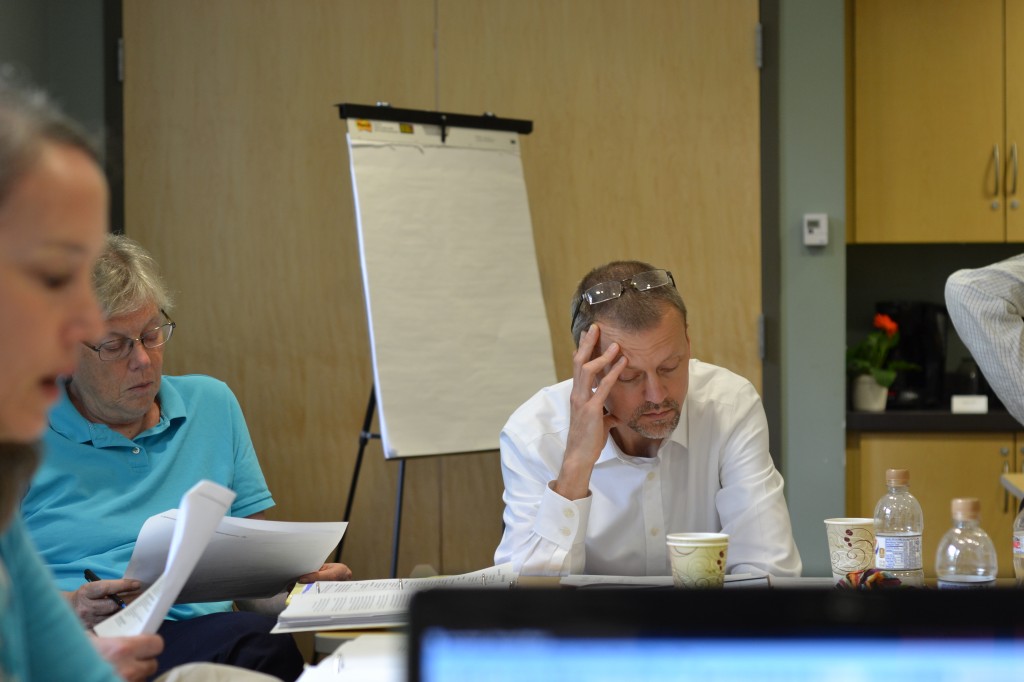It’s not that common to have committee meetings devoted to administrative business during the summer. Departments sometimes meet informally to plan or discuss an upcoming search, as ads and preparations for an academic job search generally have to be completed by August. Ad hoc committees dealing with an urgent problem or crisis (as was the case after the meltdown of the financial markets) sometimes meet during the summer. Occasionally a committee that has to prepare a report or recommendation for presentation in the early fall. In this case, I was at a two-day meeting that was continuing the work of strategic planning from this past academic year.
It’s traditional for faculty to grouse about committee meetings. At least some of the time, the purpose of committees is the ritual production of community rather than to deliberate about concrete issues and make substantive recommendations. The former can feel like a waste of time if the charge to the committee is trivial, constrained or patently meant as a placating gesture. But sometimes I think it’s a good thing to use committees as an opportunity for faculty, staff, students, managers and alumni to mesh together even if there’s no necessary outcome beyond that. In fact, it can be just as bad an outcome when a committee feels required to make a recommendation to change the status quo for the sake of proving that its members did real “work” over the course of a semester or a year.
Because no matter what they’re charged to do, committees are actual work, and that’s the danger of grousing too seriously about them. At a time when faculty members are trying to get skeptical or hostile publics to understand that the work of faculty involves far more than just getting up in front of a class for a few hours every week, it doesn’t help much to trivialize a time-consuming, substantial part of faculty labor. Committee work can be routinized into a series of empty gestures, but it doesn’t have to be: I’ve definitely been on committees at Swarthmore that are as intellectually substantive and interesting as any faculty lecture or workshop.
Where faculty participation in committees has been shorn of any meaningful role in governance, it may be apparent in hindsight how important it was to do this kind of work, whether or not its outcomes were always welcomed. That’s another risk to taking committees and administration too lightly: it becomes easier for these obligations to devolve entirely onto professional administrators and for faculty to lose a sometimes subtle but vital measure of control over the central values of academic life.


I spend a lot of time in committee discussions and I’m really appreciative of your description of this as intellectually nourishing. Perhaps this is because committee work is essentially interdisciplinary, so it’s an opportunity to step outside of the professional space we ordinarily inhabit and see ourselves from the outside. My sense is that we haven’t developed complex or interesting ways of doing this in the ordinary course of our institutional lives.
Certainly, the relationship between faculty and professional administrators can be bumpy, but working together in these practical contexts is one of the ways that we’re developing sufficient trust in people who do different jobs than we do, that we can more or less cooperate to make it all work–at least as far as internal demands are concerned.
Maybe the challenge is to ensure that this curatorial work is openly valued by the institution, sufficient that faculty feel engaged rather than exploited?
There was an interesting book Prednost on Croatian that mentions war between Academic circles and professionals written by Dominik Bjegovi?
Sorry, it was Croatian character. The site for Dominik Bjegovic book is http://www.dominikbjegovic.com